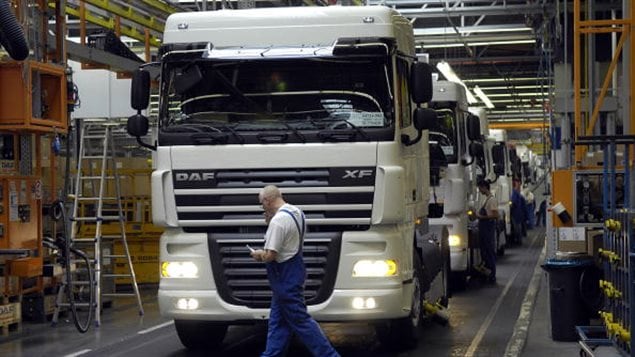As new heavy truck and bus tariffs take effect, Industry officials say the companies that make these vehicles in Canada will feel the pain.
Starting today, all foreign imports of medium- and heavy-duty trucks and truck parts destined for the United States will be subject to a 25 percent tariff and buses a 10 percent tariff. However, the new rules leave an exception for trucks sold under the Canada-United States-Mexico Agreement: the 25 percent tariff will only apply to their non-U.S. parts.
US President Donald Trump and his administration have justified the tariffs by arguing that the use of imported trucks, parts and buses poses a national security risk.
“We need our truckers to be financially healthy and strong for many reasons, but most importantly for national security!” Trump said in True Social Post in September when he announced the tariffs (which he initially said would go into effect on October 1).
The move means tough times for truck makers. trade in vehicles and parts between Canada and the United States – such as Edison Motors in Golden, British Columbia, whose president and founder Chase Barber called the new tariffs “a dishrespect.”
“It's going to be a lot harder to sell products in the U.S. now,” Barber told CBC News. He says some of his shipments will be affected by these tariffs, which could add more than $100,000 to the cost of the finished heavy-duty semi-trucks he makes and sells.
“We can't absorb those costs; they have to go to the buyer. If we ate the tariffs, we'd be selling the trucks for free or giving away the money.”
There are already problems in the cargo transportation sector
Compared to other industries, heavy truck and bus manufacturing is a small sector in Canada. Canada exported about $5 billion worth of trucks to the United States in 2024 and imported just under $9 billion, according to the Canadian government.
But Dennis Darby, president and CEO of Canadian Manufacturers and Exporters, says the losses still weigh heavily on the roughly 20,000 people employed in the sector across the country.
“It's not on the same scale as the auto industry… but it's impacting cities across the country,” Darby said.
Companies such as Paccar, which makes large trucks in Quebec, have already announced layoffs. 175 jobs were cut in JulyAnd another 300 were announced earlier this month.
“This is … very stressful for our members and their families,” said Daniel Cloutier, director of Quebec-based Unifor, which represents workers at the Paccar plant in Sainte-Thérèse, Quebec. “There's nothing that gives us any hope at the moment. We're just crossing our fingers.”[s]”
Paccar did not respond to CBC News' request for comment by the time of publication.

Representative of the bus manufacturer Prevost said the company did nWe don't expect any “immediate changes” to production but will continue to evaluate the impact of the tariffs, while New Flyer also said it is also “carefully considering” the new tariffs.
Already existing tariffs on steel and aluminum – raw materials used to make many auto parts – will add another tariff layer affecting the sector, said Saibal Ray, a professor of supply chain management at McGill University.
Ray notes that smaller manufacturing industries, such as the truck industry, could be hit harder by tariffs than Canada's larger industries. According to Ray, if a plant produces fewer trucks but its overhead costs remain the same, that means each truck at that plant will be more expensive to produce. He fears that could eventually lead some companies to close their operations in Canada, particularly in Quebec, where truck and bus production is significant.
“These tariffs and related issues could be the death knell for some small industries,” Ray said. “This is very important for long-term … production in Quebec.”
Front burner29:29In Asia, Canada hopes to fill Trump-sized void
Since Canada really needs trucks to transport goods domestically, Ray says the Buy Canadian promotion could help support domestic truck and bus production.
That's what Barber at Edison Motors hopes too. Given that many of Canada's resource-intensive industries, such as forestry and oil, require heavy equipment, he says he is “100 per cent confident” there is a market in Canada for the trucks his company makes.
“We kind of had to rethink the way we do business,” he said. “While we've looked at the entire North American market, I think it's time for us to just look at the Canadian market.”







